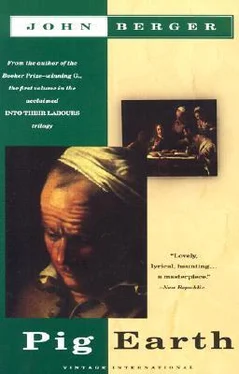By contrast the peasant is unprotected. Each day a peasant experiences more change more closely than any other class. Some of these changes, like those of the seasons or like the process of ageing and failing energy, are foreseeable; many — like the weather from one day to the next, like a cow choking to death on a potato, like lightning, like rains which come too early or too late, like fog that kills the blossom, like the continually evolving demands of those who extract the surplus, like an epidemic, like locusts — are unpredictable.
In fact the peasant’s experience of change is more intense than any list, however long and comprehensive, could ever suggest. For two reasons. First, his capacity for observation. Scarcely anything changes in a peasant’s entourage, from the clouds to the tail feathers of a cock, without his noticing and interpreting it in terms of the future. His active observation never ceases and so he is continually recording and reflecting upon changes. Secondly, his economic situation. This is usually such that even a slight change for the worse — a harvest which yields twenty-five per cent less than the previous year, a fall in the market price of the harvest produce, an unexpected expense — can have disastrous or near-disastrous consequences. His observation does not allow the slightest sign of change to pass unnoticed, and his debt magnifies the real or imagined threat of a great part of what he observes.
Peasants live with change hourly, daily, yearly, from generation to generation. There is scarcely a constant given to their lives except the constant necessity of work. Around this work and its seasons they themselves create rituals, routines and habits in order to wrest some meaning and continuity from a cycle of remorseless change: a cycle which is in part natural and in part the result of the ceaseless turning of the millstone of the economy within which they live.
The very great variety of these routines and rituals which attach themselves to work and to the different phases of a working life (birth, marriage, death) are the peasant’s own protection against a state of continual flux. Work routines are traditional and cyclic — they repeat themselves each year, and sometimes each day. Their tradition is retained because it appears to assure the best chance of the work’s success, but also because, in repeating the same routine, in doing the same thing in the same way as his father or his neighbour’s father, the peasant assumes a continuity for himself and thus consciously experiences his own survival.
The repetition, however, is essentially and only formal. A work routine for a peasant is very different from most urban work routines. Each time a peasant does the same job there are elements in it which have changed. The peasant is continually improvising. His faithfulness to tradition is never more than approximate. The traditional routine determines the ritual of the job: its content, like everything else he knows, is subject to change.
When a peasant resists the introduction of a new technique or method of working, it is not because he cannot see its possible advantages — his conservatism is neither blind nor lazy — but because he believes that these advantages cannot, by the nature of things, be guaranteed, and that, should they fail, he will then be cut off alone and isolated from the routine of survival. (Those working with peasants for improved production should take this into account. A peasant’s ingenuity makes him open to change, his imagination demands continuity. Urban appeals for change are usually made on the opposite basis: ignoring ingenuity, which tends to disappear with the extreme division of labour, they promise the imagination a new life.)
Peasant conservatism, within the context of peasant experience, has nothing in common with the conservatism of a privileged ruling class or the conservatism of a sycophantic petty-bourgeoisie. The first is an attempt, however vain, to make their privileges absolute; the second is a way of siding with the powerful in exchange for a little delegated power over other classes. Peasant conservatism scarcely defends any privilege. Which is one reason why, much to the surprise of urban political and social theorists, small peasants have so often rallied to the defence of richer peasants. It is a conservatism not of power but of meaning. It represents a depository (a granary) of meaning preserved from lives and generations threatened by continual and inexorable change.
Many other peasant attitudes are frequently misunderstood or understood in an exactly opposite sense — as the diagram of the mirror-image has already suggested. For example, peasants are thought to be money-minded whereas, in fact, the behaviour which gives rise to this idea derives from a profound suspicion of money. For example, peasants are said to be unforgiving, yet this trait, in so far as it is true, is the result of the belief that life without justice becomes meaningless. It is rare for any peasant to die unforgiven.
We must now ask this question: What is the contemporary relation between peasants and the world economic system of which they form part? Or, to put this question in terms of our consideration of peasant experience: What significance can this experience have today in a global context?
Agriculture does not necessarily require peasants. The British peasantry was destroyed (except in certain areas of Ireland and Scotland) well over a century ago. In the USA there have been no peasants in modern history because the rate of economic development based on monetary exchange was too rapid and too total. In France 150,000 peasants now leave the land every year. The economic planners of the EEC envisage the systematic elimination of the peasant by the end of the century. For short-term political reasons, they do not use the word elimination but the word modernisation . Modernisation entails the disappearance of the small peasants (the majority) and the transformation of the remaining minority into totally different social and economic beings. The capital outlay for intensive mechanisation and chemicalisation, the necessary size of the farm exclusively producing for the market, the specialisation of produce by area, all mean that the peasant family ceases to be a productive and consuming unit, and that, instead, the peasant becomes the dependent of the interests which both finance him and buy from him. The economic pressure on which such a plan depends is supplied by the falling market value of agricultural produce. In France today the buying power of the price of one sack of wheat is three times less than it was fifty years ago. The ideological persuasion is supplied by all the promises of consumerism. An intact peasantry was the only class with an inbuilt resistance to consumerism. When a peasantry is dispersed, markets are enlarged.
In much of the Third World the systems of land tenure (in large parts of Latin America one per cent of landowners own sixty per cent of the farm land, and one hundred per cent of the best land), the imposition of monocultures for the benefit of corporate capitalism, the marginalisation of subsistence farming, and, only because of these other factors, the mounting population, cause more and more peasants to be reduced to such a degree of absolute poverty that, without land or seed or hope, they lose all previous social identity. Many of these ex-peasants make for the cities where they form a millionfold mass such as has never existed before, a mass of static vagrants, a mass of unemployed attendants: attendants in the sense that they wait in the shanty towns, cut off from the past, excluded from the benefits of progress, abandoned by tradition, serving nothing.
Engels and most early-twentieth-century Marxists foresaw the disappearance of the peasant in face of the greater profitability of capitalist agriculture. The capitalist mode of production would do away with small peasant production “as a steam engine smashes a wheelbarrow.” Such prophecies underestimated the resilience of the peasant economy and overestimated the attraction of agriculture for capital. On the one hand, the peasant family could survive without profitability (cost accounting was inapplicable to the peasant economy); and on the other hand, for capital, land, unlike other commodities, is not infinitely reproduceable, and investment in agricultural production finally meets a constraint and yields decreasing returns.
Читать дальше












